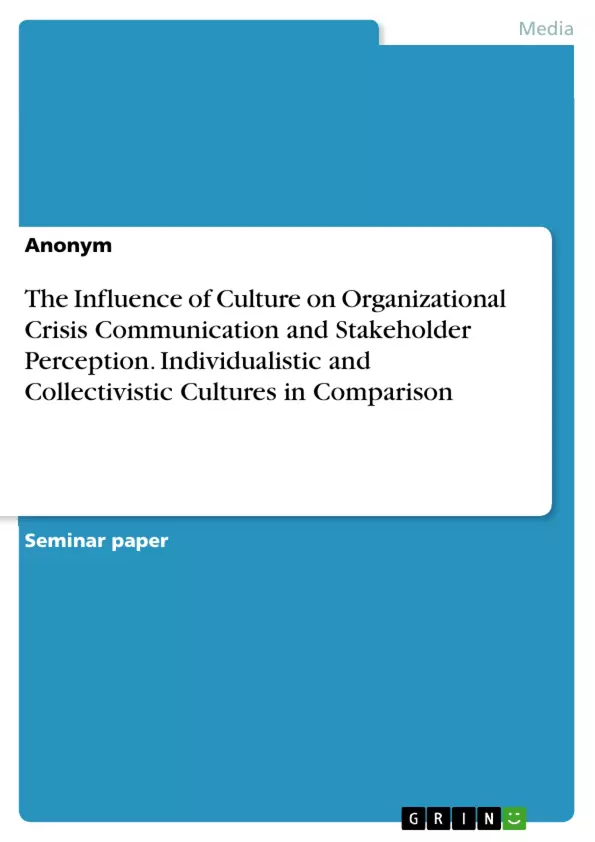Volkswagen emissions scandal, Germanwings Flight 9525, Samsung’s exploding batteries – corporate crises are becoming more and more common in today’s unpredictable environment. In the course of globalization, an increasing number of multinational organizations is operating in an international setting. Thus, the likelihood and potential impact of a corporate crisis rises. At the same time, the international potential of a crisis is aggravated by the dissemination of information in near real-time due to the Internet. Especially negative information spreads with a range and speed that increases an organization’s vulnerability to crises. As a result, the demand and importance of crisis communication is leaping. Due to the more complex and international surroundings of crisis communication, culture as a contextual factor in crisis communication plays a role of growing importance. In different cultures, different crisis responses by the organizations are expected because stakeholders perceive and react to messages in different ways dependent upon their culture. The probably most typical distinction of cultures is between collectivistic and individualistic societies. In the past, crisis communication research has been given too little attention to cultural contexts. Crisis communication research and theories almost exclusively focused on individualistic Western contexts. However, the growing relevance of culture in crisis communication is getting more and more evident in research.
For this reason, the question of the cultural influences of individualistic and collectivistic societies on organization’s crisis communication strategies as well as the stakeholders’ perception of and responses to the crisis messages in different cultural settings is discussed in the present work. To answer this question, first of all an overview of the theory of crisis communication is given, with reference to the definition and the main crisis communication theories and strategies. Secondly, the term culture is paid attention to, with a focus on the dimension of individualistic versus collectivistic cultures as an influencing factor on crisis communication. Subsequently, the current findings of the influence of individualism and collectivism on organizations’ crisis communication strategies and on the perception of stakeholders are reflected. Concluding, the results are discussed in the overall setting, limitations are shown and implications for future research are given.
Inhaltsverzeichnis (Table of Contents)
- Introduction
- Organizational crisis communication
- Culture as an influencing factor on crisis communication
- Crisis communication in individualistic and collectivistic cultures
- Organizational crisis communication messages and strategies
- Stakeholder perception of corporate crises and crisis communication
- Discussion and outlook
- References
Zielsetzung und Themenschwerpunkte (Objectives and Key Themes)
This paper examines the influence of cultural context, specifically individualistic and collectivistic societies, on organizational crisis communication strategies and stakeholder perception. The goal is to understand how these cultural factors shape crisis response strategies and how stakeholders in different cultural settings perceive and react to crisis messages.
- The role of culture in shaping crisis communication strategies
- The impact of cultural differences on stakeholder perception of crisis communication
- The importance of adapting crisis communication approaches to different cultural contexts
- A comparison of crisis communication in individualistic and collectivistic cultures
- The limitations of current crisis communication research in considering cultural factors
Zusammenfassung der Kapitel (Chapter Summaries)
- Introduction: The paper introduces the growing relevance of cultural context in crisis communication, highlighting the increasing internationalization of organizations and the rapid spread of information in today's digital environment. It emphasizes the need to consider cultural factors in crisis communication strategies, particularly the distinction between individualistic and collectivistic cultures.
- Organizational crisis communication: This chapter provides an overview of the definition and theory of organizational crisis communication. It examines key theories like Benoit's Image Restoration Theory and Coombs' Situational Crisis Communication Theory, outlining different crisis communication strategies and their applications.
- Culture as an influencing factor on crisis communication: This chapter focuses on the concept of culture as a crucial element in crisis communication. It emphasizes the cultural dimension of individualistic versus collectivistic societies, highlighting how cultural values and norms influence crisis communication practices.
Schlüsselwörter (Keywords)
Key keywords include: crisis communication, cultural context, individualistic cultures, collectivistic cultures, stakeholder perception, crisis response strategies, image restoration theory, situational crisis communication theory, attribution theory, proactive communication, stealing thunder, cultural influences, organizational crisis, globalization, digital environment.
Frequently Asked Questions
How does culture affect crisis communication?
Culture acts as a contextual factor; stakeholders in different societies perceive and react to organizational messages differently based on their values.
What is the difference between individualistic and collectivistic cultures in a crisis?
Individualistic cultures (like the US) often focus on personal responsibility, while collectivistic cultures may prioritize social harmony and group reputation.
What is the Situational Crisis Communication Theory (SCCT)?
SCCT, developed by Coombs, suggests that managers should match their crisis response strategies to the level of reputational threat and crisis type.
What does "stealing thunder" mean in crisis management?
It is a proactive strategy where an organization releases negative information about itself before it is discovered by the media or other parties.
Why is globalization increasing the vulnerability of organizations?
Multinational operations and the real-time spread of information via the internet mean a local crisis can quickly escalate into a global reputational threat.
- Quote paper
- Anonym (Author), 2018, The Influence of Culture on Organizational Crisis Communication and Stakeholder Perception. Individualistic and Collectivistic Cultures in Comparison, Munich, GRIN Verlag, https://www.grin.com/document/1240231



